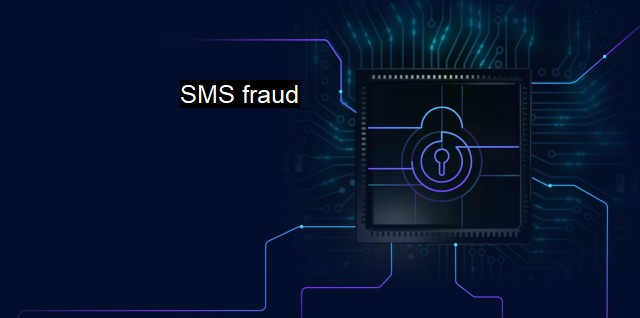What is SMS fraud?
Rising Threat to Smartphone Users: The Alarming Surge of SMS Fraud and Cyber Attacks on Personal and Financial Information
SMS fraud, also known as Smishing, belongs to the wider classification of phishing activities that broadly constitutes cybersecurity risks. In the digital age, technological innovations have greatly improved the efficiency of communication. One of the communication methods that has evolved over the years is the Short Message Services (SMS), which allows the exchange of text messages between mobile devices. Despite its numerous benefits, SMS technology has been exploited by cybercriminals to aid in various malicious activities like committing fraud, commonly known as SMS fraud.SMS fraud is a criminal activity that involves the use of deceptive text messages to manipulate individuals into revealing their private data such as bank account numbers, debit card numbers, passwords, or other sensitive information with criminal motives. The fraudsters usually disguise themselves as trustworthy entities, making it difficult for potential victims to doubt the authenticity of their requests.
It is important to note that SMS fraud is not a risk that should be taken lightly. Once the victim inadvertently succumbs to the deceptive ways of the fraudster, the repercussions could be devastating, with loss of substantial sums of money, identity theft, and loss of personal privacy among the most common outcomes. As the use of mobile phones has broadly expanded, becoming an integral part of everyday life for individuals and businesses, the potential reach of SMS fraud has also increased.
Notably, there are different types of SMS fraud prevalent today. Most common are the Lottery scams where victims receive messages of cash prizes they allegedly won and are asked to go to a specific website or call a certain number to claim the reward. Once the user acts on these instructions, they enter a coercive system where they could either end up 'paying to receive the prize' or disclosing their private data. Banking scams are another type of common SMS fraud where fraudsters pose as banks or financial institutions and prompt users to disclose their account details to correct a supposedly compromised account.
Another common form is phishing, where the fraudster poses as popular and trusted entities such as technology companies or global brands in an attempt to extract personal information. there are premium rate scams in which individuals unknowingly subscribe to premium services charged at much higher rates than regular text messages, resulting in exorbitant charges to their mobile bill.
SMS fraud is executed in a very sophisticated manner, and hence there is a significant and constant need for effective preventive measures like antivirus software and cybersecurity. Digital literacy helps immensely in this matter. Awareness among users is paramount. One must be extremely careful while sharing personal data through SMS and must not respond to suspicious or unsolicited messages.
Understanding the potential threat of cyber attacks, many antivirus firms have taken steps to provide security features that aid in the identification and blocking of SMS frauds. Implementing antivirus protection on mobile devices can provide a stronger line of defense against such attacks. The antivirus software scans incoming messages for potential threats and provides appropriate warnings to the users.
In conjunction, many cybersecurity firms offer enhanced protection by analyzing data sent via text and blocking content that represents a security risk. Advanced algorithms are put in place which can identify and track suspicious activities, deliver threat intelligence reports, and help in proactive threat hunting. two-factor authentication and OTP services have brought in an extra layer of protection.
SMS fraud represents a serious cybersecurity threat that capitalizes on the dependence of users on text messaging. Awareness of this threat and stringent innovative cybersecurity measures are pivotal towards combating and reducing the risk of such types of fraud. With antivirus and cybersecurity systems continuously evolving to respond to newer threats, users can step up their defense against unscrupulous text messages looking to exploit their vulnerabilities.

SMS fraud FAQs
What is SMS fraud?
SMS fraud refers to any fraudulent activity conducted via text messages or SMS. It can involve anything from phishing scams and Trojan horse attacks to the stealing of personal and financial information.How can I protect myself from SMS fraud?
To protect yourself from SMS fraud, it’s important to keep your phone’s operating system and security software up-to-date. Additionally, avoid clicking on links from unknown or unsolicited senders, and be wary of messages that ask for personal or financial information.What should I do if I suspect SMS fraud?
If you suspect SMS fraud, it’s important to report it to your mobile carrier and to the appropriate authorities. You should also change any passwords or account information that may have been compromised, and consider contacting your bank or credit card company if any financial information was compromised.Is SMS fraud common?
Yes, SMS fraud is becoming increasingly common as more people rely on their phones for communication and financial transactions. In fact, according to recent studies, about one in four mobile phone users has fallen victim to an SMS scam at some point. Therefore, it’s important to stay vigilant and take steps to protect your personal and financial information.| | A | | | B | | | C | | | D | | | E | | | F | | | G | | | H | | | I | | | J | | | K | | | L | | | M | |
| | N | | | O | | | P | | | Q | | | R | | | S | | | T | | | U | | | V | | | W | | | X | | | Y | | | Z | |
| | 1 | | | 2 | | | 3 | | | 4 | | | 7 | | | 8 | | |||||||